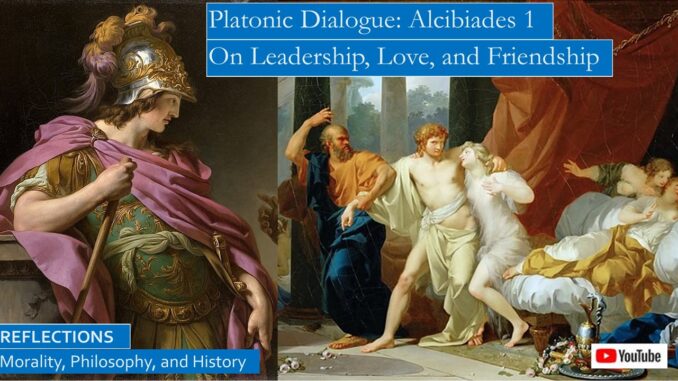
What can we learn by reflecting on Alcibiades 1, the Platonic dialogue on leadership, and on the friendship between Alcibiades and Socrates?
How successful was Socrates in turning the heart of his star pupil from carnal love to the divine love of philosophy?
Why do many modern scholars debate whether Alcibiades 1 was written by Plato, whereas the ancient, medieval, and Renaissance scholars regarded it as one of the best of the Platonic dialogues?
YouTube Script with more Book Links:
https://www.slideshare.net/BruceStrom1/platonic-dialogue-alcibiades-1-on-friendship-leadership-and-love
YouTube for this video, Alcibiades 1: https://youtu.be/WbCARvApLNk
To understand many of the main Platonic dialogues, you first need to understand the Peloponnesian Wars between Athens, Sparta, and their allies. These wars were the world wars of the ancient world. Like the modern world wars, these wars spanned several generations, were fought in two phases, consisted of innumerable battles and conflicts, and wrought deep changes among those who fought these long wars.
Summary of the Peloponnesian Wars Between Athens and Sparta
https://seekingvirtueandwisdom.com/summary-of-the-peloponnesian-wars-between-athens-and-sparta/
https://youtu.be/SW9Zq4IiLF0
Why did Alcibiades attract so many enemies, enemies who sought his demise even when it harmed Athens’ position in the war?
How was Alcibiades able, after his first exile from Athens in the middle of the Sicilian Expedition, to then switch to the Spartan side, then to the Persian side, and then back to the Athenian side?
Comeback of Alcibiades in Peloponnesian War, according to Plutarch, Thucydides, and Xenophon
https://seekingvirtueandwisdom.com/comeback-of-alcibiades-in-peloponnesian-war-according-to-plutarch-thucydides-and-xenophon/
https://youtu.be/b7QLp1HrOMs
The Persians ordered that Alcibiades be executed at the end of the war. Many Athenian citizens wrongly blamed Alcibiades for their disastrous defeat to Sparta. Since Alcibiades was known as one of the star students of Socrates, was this association a prominent reason for the Trial and Execution of Socrates?
Pondering the Death of Socrates in Xenophon, Plato, and Aristophanes
http://www.seekingvirtueandwisdom.com/pondering-the-death-of-socrates-in-xenophon-plato-and-aristophanes/
https://youtu.be/Mip1vgRKH1E
INTRODUCTION, PLATONIC DIALOGUE, ALCIBIADES 1
In antiquity through the Renaissance, Alcibiades I was a highly regarded Platonic dialogue, and was often the first dialogue serious students of philosophy studied. However, many modern scholars deprecate this dialogue, arguing that it was not written by Plato. We demur, we tend to side with the ancient, medieval, and Renaissance scholars in such judgments, who tend to be inclusive, whereas modern scholars tend to be exclusive, demanding absolute certainty of proof. Our translator agrees with us, he says that the German scholar Schleiermacher first doubted its authenticity based on scholarly taste and a superficial reading. IMHO, although it does appear to differ from his other earlier dialogues, Alcibiades I was likely either written by Plato, or maybe by one of his brightest students, with his input.[1]
We consider Alcibiades 1 to be a Platonic dialogue on love and friendship, since in addition to discussing virtuous leadership, it also explores the close friendship between Socrates and Alcibiades. There are three other Platonic dialogues on love and friendship, according to many scholars. The early dialogue on love and friendship is Lysis, which like many of his earlier dialogues, does not resolve the philosophical questions, as Socrates prefers that we examine and question how genuine our own friendships are.
Lysis, Platonic Dialogue on Love and Friendship, Where Old Men Ogle Boys at the Gymnasium
https://seekingvirtueandwisdom.com/lysis-platonic-dialogue-on-love-and-friendship-where-old-men-ogle-boys-at-the-gymnasium/
https://youtu.be/HrSZ5SPUZ7Y
The two later dialogues that contrast romantic or carnal love to divine love, were the Symposium, where the dinner guests, then Socrates, compose speeches on love,
Xenophon and Plato, Socratic Dialogue, Symposium, Romantic and Carnal Love, Part 1
https://seekingvirtueandwisdom.com/xenophon-and-plato-socratic-dialogue-symposium-romantic-and-carnal-love-part-1/
https://youtu.be/OIe5pn2S1Ls
Xenophon and Plato, Socratic Dialogue, Symposium, Divine and Noble Love, Part 2
https://seekingvirtueandwisdom.com/xenophon-and-plato-socratic-dialogue-symposium-divine-and-noble-love-part-2/
https://youtu.be/z6X3pwVTdrc
and the Phaedrus, with the famous metaphor of the heavenly chariot pulled by two steeds, one an immortal and divine steed, the other a mortal and carnal steed. This struggle between these two steeds represent the struggle between the base and divine loves in each of our souls.
Plato’s Dialogue of Phaedrus on Carnal Love and Rhetoric, Part 1
https://seekingvirtueandwisdom.com/platos-dialogue-of-phaedrus-on-carnal-love-and-rhetoric-part-1/
https://youtu.be/JFw5ThfwUAg
Plato’s Dialogue of Phaedrus on Divine Love and the Heavenly Chariot, Part 2
https://seekingvirtueandwisdom.com/platos-dialogue-of-phaedrus-on-divine-love-and-the-heavenly-chariot-part-2/
https://youtu.be/BOtavup_N4g
We will also cut a video summarizing these four dialogues on love and friendship, examining the question of whether Socrates condones homosexuality and pederasty, or men-boy love.
PLATONIC DIALOGUE, ALCIBIADES 1, BEGINS
Plato opens the dialogue:
SOCRATES: “Son of Cleinias, I think you are wondering why I, the first to love you, alone have not stopped loving you when the others have, and why, when the others crowded you with their conversation, I for so many years never said a thing to you.”[2]
The footnote says that in aristocratic Athens, that in a homosexual relationship, the younger boy would play hard to get, as he seeks the virtuous benefits of the relationship, how he can benefit and learn from an older mentor, while the elder partner seeks more the carnal pleasures. Alcibiades was in his twenties in this dialogue, but then there were older homosexual couples in ancient Greece.
What was the nature of the relationship between Alcibiades and Socrates? From his youth, Alcibiades was attracted to the teaching of Socrates. Plutarch comments, “the fact that Socrates was in love with Alcibiades strongly suggests that the boy was endowed with a natural aptitude for virtue. Socrates saw Alcibiades’ good looks as the brilliant external manifestation of this excellence.” [3]
Homosexuality and pederasty were so deeply imbedded in Greek culture that there was a Greek myth where Zeus, in the form of an eagle, kidnapped the young Ganymede, compelling him to be his cupbearer. Zeus pacified his father by gifting him immortal steeds.[4]
Socrates addresses Alcibiades as son of Cleinias, and although this would be a standard address, rarely is it used in the Platonic dialogues, and suggests that Socrates is acquainted with his family, and truly views him as a friend, and since he will likely be included in the next generation of leaders in Athens, he is someone who needs philosophical instruction.
In this dialogue, Alcibiades shows that he is indeed fond of Socrates, seeing him as a true friend. In the later dialogue, the Symposium, Alcibiades crashes the dinner party after his teacher, Socrates, has delivered his profound speech on divine love. This was a was a Socratic dialogue within the Socratic dialogue, where his friend Diotima instructed Socrates on the nature of divine love. Alcibiades proclaims to the dinner guests how, though he sought to be Socrates’ lover, Socrates rejected his physical advances, seeking rather to improve his soul. Thus, the Symposium elaborates on the sentiments expressed in Alcibiades 1.
Our translator says, “According to Diotima, the true lover ascends from loving beautiful bodies, to loving beautiful souls, to loving beautiful ideas, and at last to loving one Idea, or Form: Beauty itself.” “Passion becomes philosophy, a passionate philosophy. But Plato does not have his Symposium end here.”
Our translator continues, “Suddenly Alcibiades crashes the party, drunk, colorful and corporeal, full of the very mortal nonsense Diotima had argued should be overcome. And Alcibiades, instead of praising love, praises Socrates, the one unique man he has found, the man he has loved as no other.” [5]
Some of the Platonic dialogues may have been written in the last years of the Peloponnesian Wars, most were written afterwards. Socrates and Alcibiades both served as Athenian hoplites, as did all able-bodied aristocratic men. Socrates saved the life of Alcibiades in the Battle of Potidaea, and the favor was returned.
In this battle, Plutarch tells us that “a fierce engagement took place in which both men displayed great bravery, and when Alcibiades fell wounded, Socrates stood over him, kept the enemy at bay, and manifestly, in plain view of everyone, saved him along with his arms and armor.”[6]
The Platonic dialogues were written after the spectacularly unsuccessful Sicilian Expedition. The first phase of the Peloponnesian Wars had concluded with the Peace of Nicias, but Alcibiades, seeking glory, used his oratorical gifts to persuade the Athenian Assembly to commit over a hundred triremes and thousands of hoplite troops to conquer the Greek colony and ally of Sparta, Syracuse in Italy. This force represented well over half of the Athenian navy.
However, after the ships set sail, the political enemies of Alcibiades recalled him to Athens to be tried under trumped-up charges. Fearing he would lose the case, since the soldiers on the expedition would not be voting, he fled, and was granted exile with the Spartans, the enemies of Athens.
Alcibiades could have been as famous as Caesar or Napoleon, known for their military conquests. IMHO, if Alcibiades had not been charged, he could have defeated and absorbed Syracuse into the Athenian Empire, and perhaps conquered the rising Carthaginian Empire as well. Had he been able to project Greek power further west, perhaps he would have triumphed over Rome, and we would be inheritors of the Athenian Empire rather than the Roman Empire.
The Syracuse Expedition was lost by the overly cautious and procrastinating general Nicias. All of these triremes and hoplites and leading generals were decimated by a complete Syracusan victory that nearly caused Athens to lose the second phase of the Peloponnesian Wars.
Athens’ Disastrous Defeat at Syracuse in the Sicilian Expedition, the Peloponnesian Wars
https://seekingvirtueandwisdom.com/athens-disastrous-defeat-at-syracuse-in-the-sicilian-expedition-the-peloponnesian-wars/
https://youtu.be/SaIqQ35ysl4
This is the background for:
SOCRATES: “You say, Alcibiades, that you have no need of anyone for anything, for your advantages are so great that you lack nothing, beginning with your body and ending with your soul.” “You are most beautiful and tall and” “a member of the most influential family in Athens.” His father had died when he was young, he was raised by the family of Pericles, the renowned founder of the radical democracy of Athens.
Socrates continues, “I will also add that you are wealthy, but you seem to me to pride yourself least on this. Boasting of all these things, you have defeated your lovers,” making them feel inferior.” “You may wonder what I have in mind in not giving up my love and what hope I have in remaining after the others have fled.”[7] And Alcibiades confirms that he is, indeed, curious.
Our translator notes that “paradoxically it may be precisely Alcibiades’ passion for glory which make him a potential philosopher, though this very passion will ultimately destroy him.” “Socrates puffs up Alcibiades’ ambition, only to show that it is hollow and to attempt to replace it with a philosophical ambition every bit as grand. This is a dangerous strategy, but perhaps the only likely to have any success with such a man.[8]
The theme of Socrates attempting to tamp down the passions of Alcibiades is depicted by the many paintings of Socrates tearing Alcibiades from the arms of courtesans and lovers.
So, Alcibiades is not the typical interlocuter in the Platonic dialogues, which could explain the difference in style between this dialogue and the other earlier and later Platonic dialogues. Alcibiades enjoys the give and take, understanding how the Socratic dialectic conversation evolves. He is not offended like many of Socrates’ more ambivalent or mildly hostile interlocuters, and neither is he as deferential as Socrates’ admiring interlocuters.
This is one of the few dialogues where before Socrates begins his questioning, he asks Alcibiades for a small favor, the small favor being that Alcibiades ponder and answer his questions. Perhaps this also reflects Socrates’ recognition of Alcibiades’ impulsiveness, a strength whose weakness often prevents philosophical reflection, encouraging rash decision making.
PRIMARY QUESTION OF POLITICS: WHO LEADS WHOM?
The primary question in politics is always, Who leads whom? Do informed leaders lead the polis, or citizens, in their wisdom? Or does public opinion, the majority of the citizens, lead the state in reckless ignorance?
Thus, SOCRATES asks, “Alcibiades, what is it that the Athenians intend to deliberate about that leads you to rise up to advise them? Is it because it is something you understand better than they do?”[9]
After some back and forth, after patient questioning, Socrates elicits from Alcibiades the primary reason for political deliberations in the Athenian Assembly:
ALCIBIADES: “When they are deliberating about war, Socrates, or peace, or some other of the affairs of the city.”
This is clearly Alcibiades’ order of preference, the Peace of Nicias was eagerly sought by both sides, as both sides were exhausted by the constant raids by both sides, by the annual Spartan destruction of the Athenian farms and homes, and by the constant raids by the Athenian navy on the outlying settlements of Sparta and her allies.
SOCRATES: “Do you mean when they are deliberating about whom they should make peace with, and whom they should war against, and in what way?”[10] But in the restatement of Socrates, he mentions peace before war, but to Alcibiades, there is only glory in war, not peace.
Socrates has many questions on which is the better time to wage war, and for how long, and what “better” really means, prompting ALCIBIADES to admit that Athenians declare war when “we say they are being cheated of something, or being done some violence, or being deprived of something.”
SOCRATES: “How is it we have suffered each of these things?
ALCIBIADES: “Do you mean, Socrates, whether we feel we suffer justly or unjustly?”[11] This is the ideal objective of the Socratic method, prompt the student to deduce the key moral issue in question, which is always more effective than lecturing morality. Perhaps the Socratic method would be more effective when parents seek to influence the actions of their teenagers.
After patiently enduring the probing of the important question of what is just and unjust when determining the wise choice of war or peace, Alcibiades finally cuts to the chase, admitting a harsh political reality:
ALCIBIADES: “I think, Socrates, that the Athenians and the rest of the Greeks rarely deliberate about whether something is more just or more unjust. This sort of thing they believe to be clear,” they would rather debate what is most advantageous for them. “What is just is not the same as what is advantageous, and many have profited from having unjustly done great injustice; while others, I think, have gotten no political advantage from doing what is just.”[12]
Which then leads to another line of questioning: What is and is not advantageous? Would just actions be more likely to be advantageous in the long run? When Socrates challenges Alcibiades to show him “that the just is sometimes not advantageous,” Alcibiades accuses him of hubris. But Socrates does not fall into this trap, warriors and generals can be guilty of hubris, but how can a philosopher be guilty of hubris? Of course, anyone can be guilty of hubris, but those who accuse an honest philosopher of hubris tell us more about themselves, how they do not wish to learn the lessons an honest philosopher has to offer. In this context, those who are honest seek the two-fold love of God, or truth, and love of neighbor.
Socrates asks Alcibiades if it is possible that an action be both disgraceful and just, and Alcibiades says this is not possible, and that “the just is also admirable.” But sometimes that which is disgraceful is also good, as death is deemed disgraceful, and sometimes the good soldier loses his life trying to save the life of his comrade, while others who witness the death of their comrades sometimes survive the battle.
Socrates then inquires whether courage is good.”
ALCIBIADES: “I would not choose even to live as a coward.”
SOCRATES: “Then cowardice seems to you to be the most extreme of bad things?”
ALCIBIADES: “To me it does.”
SOCRATES: “Cowardice is equal to being dead, it seems.” “Courage is among the best of things, and death among the worst.”[13]
Although these statements on courage are true in all cultures, their primary emphasis is a reminder that all ancient cultures are, by necessity, warrior cultures, as we learn in our studies of the Iliad and Torah. Ancient citizens lived in fear that if their polis were ever conquered and pillaged by a hostile force, all military age men would be slaughtered, and the women and children would be enslaved.
The Iliad, the Basis of Greek Culture and the Western Philosophical Tradition
http://www.seekingvirtueandwisdom.com/iliad_blog01/
https://youtu.be/DpmuhZJUJn0
The Warrior Cultures of the Iliad and the American Indian, Bravely Visiting the Enemy Camp
http://www.seekingvirtueandwisdom.com/iliad-blog-3-visiting-the-enemy-camp-greeks-vs-indians/
https://youtu.be/ynIx-AVI2f8
Concubines in the Iliad, Old Testament and Christian Tradition
http://www.seekingvirtueandwisdom.com/iliad_blog02/
http://www.seekingvirtueandwisdom.com/the-iliad-blog-4-briseis-chryseis-arent-all-concubines-the-same/
https://youtu.be/bGHHD7XTvr0
The Iliad of Homer: Glory, Honor, Madness and Futility of War
http://www.seekingvirtueandwisdom.com/the-iliad-blog-5-the-tide-of-battle-turns-against-the-greeks/
http://www.seekingvirtueandwisdom.com/the-iliad-blog-6-embassy-to-achilles-oration-failed-meeting/
http://www.seekingvirtueandwisdom.com/the-iliad-blog-7-the-deaths-of-patroclus-and-hector/
https://youtu.be/7lI2ZQ50wRc
As Socrates ponders what is good and bad, what is advantageous or disadvantageous, what is just or unjust, what is courageous or cowardly, what is admirable or disgraceful, and how these pairs of opposites interrelate with each other, ALCIBIADES throws up his hands, like many whom Socrates traps in these unending questions, objecting: “By the gods, Socrates, I don’t know what I am saying myself, and I seem just like someone in a strange state. As you question me, at one time things seem one way, but at another time they seem different.”
Usually when the target of Socrates’ relentless questions reaches this impasse, they find a reason to leave the discussion, but Alcibiades remains.
SOCRATES: “Now concerning what is just and unjust, admirable and disgraceful, good and bad, and advantageous and disadvantageous, don’t you say that you are confused as you give your answers? And isn’t it clear that it is because you don’t know about these things that you are confused?” Alcibiades agrees.[14]
Then Socrates’ questions ponder confusion and understanding. Plato introduces an historically interesting metaphor about a helmsman on a ship:
SOCRATES: “What if you were sailing in a ship? Would you have an opinion about whether the tiller should be moved in or out, and, since you do not know, would you be confused, or would you turn this over to the helmsman and keep your peace?”
ALCIBIADES: “I would turn it over to the helmsman.”
SOCRATES: “So you are not confused about the things you don’t know, so long as you know that you don’t know them?”
ALCIBIADES: “I likely am not.”
SOCRATES: “Now are you aware that mistakes in action come through this sort of ignorance, that of the person who doesn’t know but thinks he does know?”
The translator’s footnote wonders whether this refers to the minor military defeat where Alcibiades left the fleet seeking further supplies and funding when Lysander was evading his efforts to force a naval action. Alcibiades put his friend and helmsman, or second-in-command, Antiochus, in charge with strict orders not to engage the naval forces of Lysander. But Antiochus was Greek, and like all Greeks sought glory, so he disobeyed orders, he attacked, and was defeated. This led to Alcibiades’ fall from grace and his last voluntary exile from Athens, leading to his eventual death.[15]
Ironically, in this incident it was the Athenian citizens who thought they knew what they did not know. Professor Kenneth Harl of the Teaching Company comments that the Athenians were so accustomed to the inevitable successes by Alcibiades that any defeats they ascribed to his inattentiveness, judging him far too harshly, driving away the general that could have guaranteed them eventual victory.[16]
SOCRATES REFLECTS ON SPARTAN AND PERSIAN RULERS
At this point of the dialogue, Socrates reflects on the rulers of Sparta and Persia. We agree with the translator, who sees irony in the comment that the “wives of the kings of the Lacedaemonians are publicly guarded by the ephors so that, as far as possible, no one escapes their notice and become king who has been born to someone other than a descendant of Heracles.”[17]
Why were these reflections on Spartan and Persian rulers inserted here? To answer this question, we need to consider the further adventures of Alcibiades.
After fleeing into exile to Sparta after he was recalled to Athens during the Sicilian Expedition, he provided good advice to the Spartans. But Alcibiades being Alcibiades, he could not help himself, he seduced the queen and impregnated her. Some ancient sources say he hoped his son could sit on the throne of Sparta.
Next, Alcibiades traveled to Ionia, the coast of Turkey today, where he offered his services as advisor to the Persian satrap Tissaphernes. His good advice was to fund the Spartan war effort as economically as possible, so the Athenians and Spartans would wear each other out, so Persia could take advantage of their weakness.
Comeback of Alcibiades in Peloponnesian War, according to Plutarch, Thucydides, and Xenophon
https://seekingvirtueandwisdom.com/comeback-of-alcibiades-in-peloponnesian-war-according-to-plutarch-thucydides-and-xenophon/
https://youtu.be/b7QLp1HrOMs
In Alcibiades 1, Plato describes the ideal education for future Persian kings. Four royal tutors of excellence are chosen: “the wisest man, the most just man, the most moderate man, and the most courageous man.” “The most just man teaches him to tell the truth throughout his life; the most moderate man teaches him not to be ruled by any pleasure, so that he may be accustomed to be free and truly royal, since he rules first of all over” his emotions, “and is no slave to them. The most courageous man teaches by preparing him to be fearless and without dread, since to be afraid is to be a slave.”[18] Courage is a primary virtue for the ruler in a warrior culture.
This echoes Xenophon’s description of the education of the kings and nobles of Persia in his Cyropaedia, the biography of Cyrus the Great. His addition is that hunting dangerous beasts practices skills used in battle.
Xenophon’s Cyropaedia, Biography of Cyrus the Great, King of Persia
https://seekingvirtueandwisdom.com/xenophons-cyropaedia-biography-of-cyrus-the-great-king-of-persia/
https://youtu.be/E4BFSIpHHGk
Surprisingly, Alcibiades manages to get elected leader of the Athenian fleet at Samos, winning several battles. After a few years, he was on the path to winning the Peloponnesian Wars for Athens, until he was forced to resign again after a minor defeat and went into voluntary exile once again. At the end of the war, the Persian satrap Pharnabazus orders his archers to execute the mighty Alcibiades. One famous painting shows him, shot full of arrows, in the arms of his last lady lover, who desperately attempts to rescue him from his fate.
Spartan Lysander Shows Mercy on Athens, Ending the Peloponnesian Wars
https://seekingvirtueandwisdom.com/spartan-lysander-shows-mercy-on-athens-ending-the-peloponnesian-wars/
https://youtu.be/giNzqNoOH3Y
SOCRATES REFLECTS: WHO IS THE GOOD RULER?
The questioning by Socrates is again directed by Alcibiades towards the Realpolitik as he once against discusses the good:
SOCRATES: “Who do you say is good?”
ALCIBIADES: “I say it is those who are able to rule in the city.”
This is analogous to the discussion in the Republic of whether the just are those who are politically powerful, that might makes right.
SOCRATES: “So you are talking about ruling people who make use of other people?” Alcibiades agrees.
SOCRATES: “So just what do you mean by being able to rule people who make use of people?”
ALCIBIADES: “I mean those who have a share in citizenship and who do business with each other.”
And SOCRATES returns to this metaphor: “So what is this?” Is this like the art of “ruling those who have a share in sailing?”
ALCIBIADES: “That of the helmsman.”
Socrates asks what advice the helmsman of the city, or its director, the good politician, should offer the citizens.
ALCIBIADES: Advice “for running the city better and keeping it safe.”
Through further questions, SOCRATES asks whether “a city becomes better and is better tended and run when whenever what is present or absent?”
ALCIBIADES: “It seems to me, Socrates, that whenever there is friendship among the people for each other, and hatred and factional strife are absent.”
SOCRATES: “By friendship do you mean agreement or disagreement?”
ALCIBIADES: “Agreement.” Here the translator notes that the Greek word can refer to either intellectual agreement or emotional concord.[19]
INSCRIPTION CARVED AT TEMPLE OF DELPHI: KNOW THYSELF
Alcibiades admits to Socrates that a leader must be a student of philosophy, which in Greek means love of wisdom, so he acts wisely in governing the state. Through philosophical reflection we come to know ourselves, we know our strengths and weaknesses, and we realize what we need to study to become more effective citizens or rulers.
SOCRATES: “Is it easy to know oneself, or did some simpleton inscribe this on the temple at Delphi? Or is it difficult, and not a matter for just anyone,” to know thyself?
ALCIBIADES: “To me, Socrates, it has often seemed to be a matter for anyone, but has often seemed most difficult.”
SOCRATES: “Well, Alcibiades, whether it is easy or not, nevertheless that is how it stands for us: if we knew this we could perhaps recognize what care of ourselves is, but in ignorance of this we never could.”
When exploring these questions, Socrates wonders whether man is body or soul, or both, and whether the soul rules the body. SOCRATES wonders whether “it would be admirable to believe that they were communicating with each other, making use of words, by soul towards soul,” and Alcibiades agrees.
SOCRATES: “So he who commands that one know oneself bids us to know our souls.” [20]
DIVINE PHILOSOPHICAL LOVE OF SOCRATES FOR HIS FRIEND ALCIBIADES
SOCRATES steers the questioning to the personal, which demonstrates that this dialogue is also about love and friendship: “If someone was a lover of Alcibiades’ body, did he love Alcibiades, or something that belonged to Alcibiades?” Alcibiades agrees.
SOCRATES: “So he who loves your soul is who truly loves you?”
ALCIBIADES: “This is where your argument leads.”
SOCRATES: “Now, the one who loves your body is going to depart, since its bloom is fading?” Alcibiades agrees.
This reminds me of a church acquaintance from many decades ago, who was married to a loving fourth wife, a truly godly woman, who was relating the mistakes and hurts of his youth. He divorced his pretty first wife when she started looking older, and a decade or so later found this happened to his second wife. She was bitter, she ruined his third marriage, and he had to warn his fourth wife of the impending attempted sabotage.
SOCRATES: “But the one who loves your soul will not depart, so long as it is getting better.”
ALCIBIADES: “That is likely,” playing the part of the passive responder. But is it wise to qualify for this, as long as the soul is improving? There are times in our lives where we either backslide morally or financially, or become discouraged, and we need those who love us to show us unconditional love, at least for a time, to help us back on our feet emotionally and spiritually.
ALCIBIADES: “That is likely,” which sounds tentative. Since this is not affirmative, perhaps he is not committed to the relationship.
SOCRATES: “Then I am the one who does not leave but remains as your body is fading, now that the others have departed.” But the problem with close friendships, especially marriages, is that you cannot work to improve them alone. But Alcibiades does redeem himself:
ALCIBIADES: “You have done well, Socrates, and may you not leave me.”
SOCRATES: “Well, make the effort to be as beautiful as you can be,” and here Socrates must mean to be beautiful in the soul.
ALCIBIADES: “I will make the effort,” which is the first time Alcibiades commits to selflessness rather than selfishness in this relationship.
SOCRATES: “I alone loved you, while the others loved what belonged to you. What belongs to you is passing its prime, but you are beginning to bloom. And now, unless you are corrupted by the Athenian people and become uglier, I shall not leave you.” Again, there is a qualifier, could Socrates be hinting that close friendships between men are always more conditional than marriages should be?
SOCRATES continues, “For this is what I most fear, that you will be corrupted by becoming a people lover.”
SOCRATES then warns Alcibiades, lest he become corrupted, that he “should take care of his soul and look after it.”[21] Our translator notes that he translates the Greek word as “care,” but that the original Greek refers to “effort, diligence, and attention rather than emotional attachment, and that taking care of something does not merely mean to keep it safe, but to improve it.”[22]
SOCRATES queries, “if a soul is to know itself,” must it look into itself for the excellence that blooms from wisdom? Alcibiades agrees.
SOCRATES: “Can we say that anything in the soul is more divine than that which is concerned with knowing and thought?” We must remember that to Socrates knowledge is virtue.
ALCIBIADES: “We cannot.”
SOCRATES: “So it is to God that this aspect of soul is similar, and one looking to this and knowing all that is divine, both God and thought, would in this way know himself.”
The translator has this footnote: “The Greeks sometimes used the singular for god, theos, in contexts that show that neither ‘the god’ or ‘a god’ is meant, leaving us with ‘God.’ But no commitment to monotheism is implied; rather, theos refers to the qualities all gods share,” which is called henotheism, “and often approaches ‘the gods’ in meaning.” I agree with our translator. The stoic philosophers constantly refer to God and Zeus interchangeably, but since the Church Fathers, and in particular the Eastern Church Fathers, are influenced so deeply by Greek and Roman moral philosophy, especially stoicism, that they do view theos as inferring a monotheism theologically.
SOCRATES adds, “And we agreed that knowing oneself is moderation?” Alcibiades agrees.[23] The translator’s footnotes indicates that the Greek term for moderation suggests being of sound mind, or self-control and self-knowledge.[24]
SOCRATES REFLECTS: WHAT IS TRUE HAPPINESS?
SOCRATES proffers that “unless one is moderate and good, it is not possible to be happy,” and that “bad people are wretched.” Alcibiades agrees.
SOCRATES: “So it’s not the rich who will avoid being wretched, but the one who becomes moderate?” Alcibiades agrees.
SOCRATES: “So the ruler must not be tyrannical, my excellent Alcibiades,” if both ruler and ruled “are to be happy, with excellence.”
But SOCRATES is not hopeful for the future of Athens under Alcibiades. “I am filled with dread, not because I do not trust in your nature, but because I see the force of the city and fear that it will overcome both me and you.”[25]
Indeed, Alcibiades will fail in his efforts to advise the Athenian generals to move the Greek triremes to move to a safe harbor, which would have prevented their destruction which led to Athens losing the Peloponnesian Wars, turning the Athenians against the memory of Alcibiades. Socrates will also fail in his defense in his trial and execution by the Athenian Assembly, he could not overcome the suspicion that many citizens felt towards Socrates, friend and teacher of Alcibiades and several enemies of the radical democracy.
[1] Socrates and Alcibiades, Plato, translated by David M Johnson (Focus Philosophical Library, 2003), Introduction, footnote 7, p. xiv.
[2] Socrates and Alcibiades, Plato, Alcibiades 1, 103a, p. 1.
[3] Plutarch, Greek Lives, Alcibiades, translated by Robin Waterfield (New York: Oxford University Press, 2008, 1998, originally 100+ AD), Chapter 4-6, pp. 224-226.
[4] https://en.wikipedia.org/wiki/Ganymede_(mythology)
[5] Socrates and Alcibiades, Plato, Introduction, p. vii.
[6] Plutarch, Greek Lives, Alcibiades, Chapter 7, p. 227.
[7] Socrates and Alcibiades, Plato, Alcibiades 1, 104a-c, p. 2.
[8] Socrates and Alcibiades, Plato, Introduction, p. xv.
[9] Socrates and Alcibiades, Plato, Alcibiades 1, 106c, p. 4.
[10] Socrates and Alcibiades, Plato, Alcibiades 1, 107d, p. 7.
[11] Socrates and Alcibiades, Plato, Alcibiades 1, 109a-b, p. 9.
[12] Socrates and Alcibiades, Plato, Alcibiades 1, 113d, p. 17.
[13] Socrates and Alcibiades, Plato, Alcibiades 1, 115e, pp. 18-21. The footnotes say this last statement is not found in most manuscripts, but in quotations by later authors.
[14] Socrates and Alcibiades, Plato, Alcibiades 1, 116e-117a, pp. 23-24
[15] Socrates and Alcibiades, Plato, Alcibiades 1, 117d, p. 25.
[16] Kenneth Harl, The Teaching Company, The Peloponnesian Wars, 2007. Also, see www.wondrium.com
[17] Socrates and Alcibiades, Plato, Alcibiades 1, 121c, p. 32.
[18] Socrates and Alcibiades, Plato, Alcibiades 1, 121e-122b, p. 33.
[19] Socrates and Alcibiades, Plato, Alcibiades 1, 125b-127d, pp. 38-42.
[20] Socrates and Alcibiades, Plato, Alcibiades 1, 129a-130e, pp. 45-48.
[21] Socrates and Alcibiades, Plato, Alcibiades 1, 131c-132c-, pp. 50-51.
[22] Socrates and Alcibiades, Plato, Alcibiades 1, footnote for 119a, p. 28.
[23] Socrates and Alcibiades, Plato, Alcibiades 1, 133b-c, p. 53.
[24] Socrates and Alcibiades, Plato, Alcibiades 1, footnote for 131b, p. 49.
[25] Socrates and Alcibiades, Plato, Alcibiades 1, 134a-135e-, pp. 55-58.

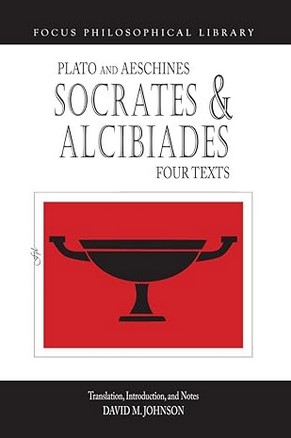
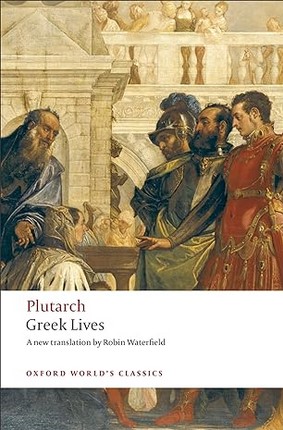
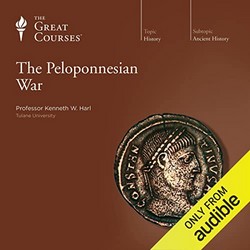
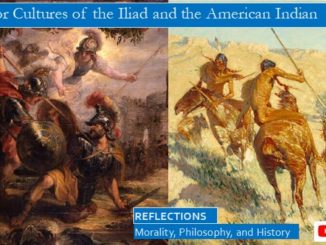
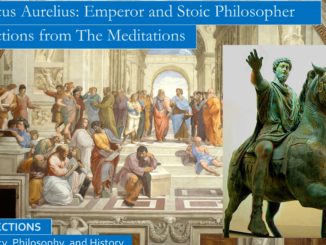
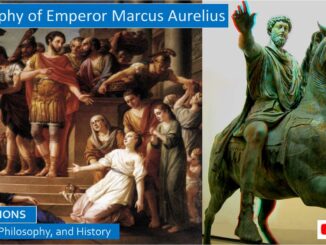
1 Trackback / Pingback